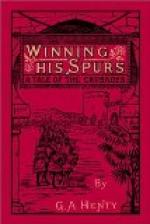The king’s brow cleared, for in truth he was very proud of his English nationality, and would have been sorely vexed to see the discomfiture of an English champion, even though that champion were a boy.
“Brother Phillip,” he said, turning to the king, “I will wager my gold chain against yours on yonder stripling.”
“Methinks that it were robbery to take your wager,” the King of France said. “The difference between their bulk is disproportionate. However, I will not baulk your wish. My chain against yours.”
The rule of the fight was that they were to commence with Swords, but that either could, if he chose, use his battle-axe.
The fight need scarcely be described at length, for the advantage was all one way. Cuthbert was fully a match in strength for his antagonist, although standing nigh a foot shorter. Constant exercise, however, had hardened his muscles into something like steel, while the teaching that he had received had embraced all that was then known of the use of arms.
Science in those days there was but little of; it was a case rather of hard, heavy hitting, than of what we now call swordsmanship.
With the sword Cuthbert gained but slight advantage over his adversary, whose superior height enabled him to rain blows down upon the lad, which he was with difficulty enabled to guard; but when the first paroxysm of his adversary’s attack had passed, he took to the offensive, and drove his opponent back step by step. With his sword, however, he was unable to cut through the armour of the Frenchman, but in the course of the encounter, guarding a severe blow aimed at him, his sword was struck from his hand, and he then, seizing his axe, made such play with it that his foe dropped his own sword and took to the same weapon.
In this the superior height and weight of his opponent gave him even a greater advantage than with the sword, and Cuthbert knowing this, used his utmost dexterity and speed to avoid the sweeping blows showered upon him. He himself had been enabled to strike one or two sweeping strokes, always aiming at the same place, the juncture of the visor with the helmet. At last the Frenchman struck him so heavy a blow that it beat down his guard and struck his steel cap from his head, bringing him to the knee. In an instant he was up, and before his foe could be again on guard, he whirled his axe round with all its force, and bringing it just at the point of the visor which he had already weakened with repeated blows, the edge of the axe stove clean through the armour, and the page was struck senseless to the ground.
A great shout broke from the English portion of the soldiery as Cuthbert leant over his prostrate foe, and receiving no answer to the question “Do you yield?” rose to his feet, and signified to the squire who had kept near that his opponent was insensible.
King Richard ordered the pursuivant to lead Cuthbert to the royal enclosure.




